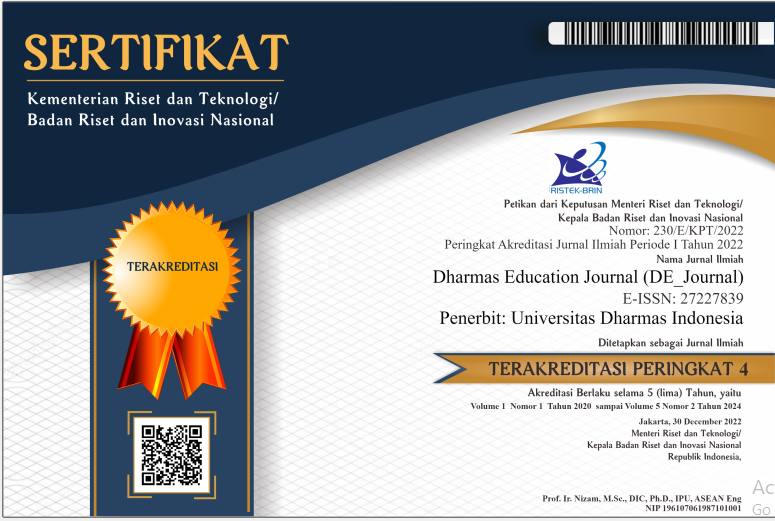MODEL LEARNING MANAGEMENT SYSTEM (LMS) PADA PEMBELAJARAN PAI DI SMP ISLAM AL-AZHAR 2 JAKARTA
DOI:
https://doi.org/10.56667/dejournal.v4i2.1113Keywords:
Model, LMS, PAI Learning, Al-AzharAbstract
Problems in PAI learning are often encountered, namely the superiority of PAI learning is still low, how to educate parents, environment, climate, strict teachers. The purpose of this study is to describe the model, preparation, implementation, evaluation, follow-up and analysis of the learning constraints of the LMS model in PAI learning. This type of research is qualitative with a case study approach that is critical-analyst with data collection techniques of observation, interviews and documentation. The results of this study are: (1) The use of technology is very important to support modern learning activities; (2) In planning learning with LMS, the teacher makes syllabus and lesson plans, determines, designs the methods and media used when learning with LMS; (3) The implementation of PAI learning begins with greetings, opening by the teacher, checking student attendance, providing stimulus, providing teaching materials by presenting teaching materials using LMS; (4) In the evaluation there are affective, cognitive and psychomotor assessments, with supporting applications such as quizizz, interactive videos, google forms, for UTS and UAS using the LMS application with integrated questions from Al-Azhar Center; (5) Follow-up to PAI learning requires training and socialization of LMS; (6) Factors inhibiting PAI learning with LMS: LMS system disturbances, internet network disturbances, display features and notifications on the Al-Azhar LMS are out of sync, the smartphone LMS application needs to be upgraded
Downloads
References
Alhamuddin. (2012). Pemanfatan Media Pembelajaran Berbasis Ict Dalam Pembelajaran Pendidikan Agama Islam (Pai). Jurnal Penelitian Pendidikan Dan Ekonomi.
Anas, H. (2022). Pengajaran PAI dan Problematikanya di Sekolah Umum Tingkat SMP. RJS :Rechtenstudent Journal.
Basyit, A. (2018). PERKEMBANGAN PENDIDIKAN ISLAM DI INDONESIA. Rausyan Fikr : Jurnal Pemikiran Dan Pencerahan. https://doi.org/10.31000/rf.v14i1.812
Fakhruddin, A. M., Putri, L. O., Rizqi, P., Tanzilla, A., Annisa, R. N., Khalda, R., & As, B. (2022). Efektivitas LMS ( Learning Management System ) untuk Mengelola Pembelajaran Jarak Jauh pada Satuan Pendidikan. Jurnal Pendidikan Tambusai.
Hanipudin, S. (2019). Pendidikan Islam di Indonesia dari Masa ke Masa. Matan : Journal of Islam and Muslim Society. https://doi.org/10.20884/1.matan.2019.1.1.2037
Moch. Mu’izzuddin. (2022). Analisis Kebutuhan Aplikasi Learning Manajemen System untuk Mapel Pendidikan Agama Islam pada Sekolah di Jawa Tengah. Jurnal Edutrained : Jurnal Pendidikan Dan Pelatihan, 6(1), 63–73. https://doi.org/10.37730/edutrained.v6i1.158
Nanik, N. (2021). Penerapan Pembelajaran Pendidikan Agama Islam Berbasis ICT di SMPN 1 Kota Bengkulu. GHAITSA: Islamic Education Journal.
Pegawai, T. P. (2015). Strategi Pemanfaatan Media Pembelajaran. In El-Wasathiya: Jurnal Studi Agama.
Ramdani, R., Rahmat, M., & Fakhruddin, A. (2018). MEDIA PEMBELAJARAN E-LEARNING DALAM PEMBELAJARAN PENDIDIKAN AGAMA ISLAM DI SMA LABORATORIUM PERCONTOHAN UPI BANDUNG. TARBAWY : Indonesian Journal of Islamic Education. https://doi.org/10.17509/t.v5i1.13332
Sugiyono. (2016). Metode Penelitian, Kuantitatif, Kualitatif dan R & D. Alfabeta.
Syahrijar, I., Zahra, I. A., Supriadi, U., & Fakhruddin, A. (2023). Pembelajaran Pendidikan Agama Islam Berbasis Digital. AL-HIKMAH (Jurnal Pendidikan Dan Pendidikan Agama Islam).
WIRAGUNAWAN, I. G. N. (2022). PEMANFAATAN LEARNING MANAGEMENT SYSTEM (LMS) DALAM PENGELOLAAN PEMBELAJARAN DARING PADA SATUAN PENDIDIKAN. EDUTECH : Jurnal Inovasi Pendidikan Berbantuan Teknologi. https://doi.org/10.51878/edutech.v2i1.981
Downloads
Published
How to Cite
Issue
Section
License
Copyright (c) 2023 Dharmas Education Journal (DE_Journal)

This work is licensed under a Creative Commons Attribution-NonCommercial-NoDerivatives 4.0 International License.
Makalah yang disampaikan diasumsikan tidak mengandung bahan propietary yang tidak dilindungi oleh hak paten















